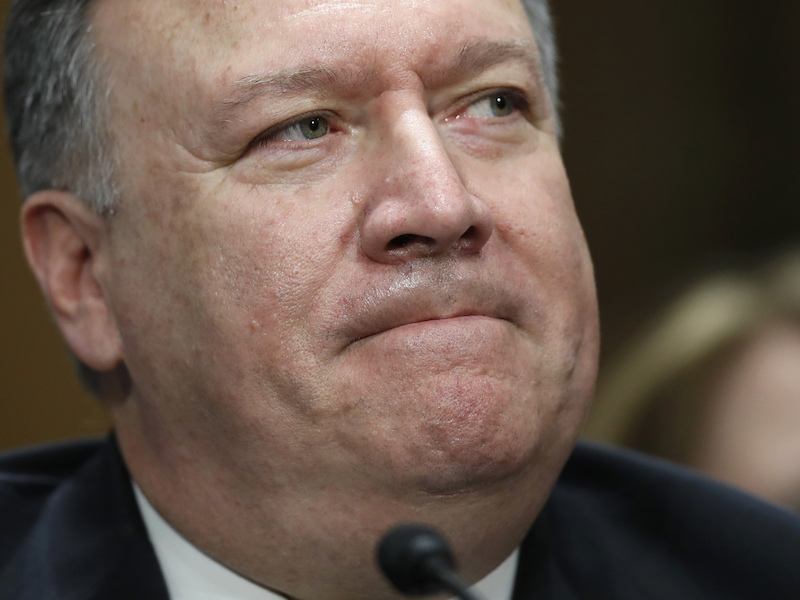
WASHINGTON (RNS) — Mike Pompeo, a Republican congressman from Kansas before he took the helm of the CIA in 2017, is President Trump’s nominee now for secretary of state. But Pompeo’s fitness for the office has been called into question over statements he has made and legislation he has sponsored, to the point that some wonder whether the Senate will confirm the former Army officer and Harvard Law School graduate.
Much of what senators and religious groups have called into question about Pompeo is tied to his abiding and conservative faith. So where is all this religious controversy coming from? Here are five faith facts about Pompeo:
1. Pompeo’s Christian faith is central in his life.
He said he was “brought to Jesus Christ” during his early years as a cadet at the United States Military Academy at West Point by two of his classmates. He later became a member of Eastminster Presbyterian Church in Wichita, Kan., where he served as a deacon from 2007-2009 and once taught Sunday school.
The church was originally affiliated with the Presbyterian Church (USA) but voted to cut ties in 2011 after the denomination made moves to ordain LGBTQ people and allow pastors to officiate at same-sex marriages. Eastminster is now affiliated with the Evangelical Presbyterian Church, a smaller, more theologically conservative denomination.
READ: Pompeo’s Kansas church asks God to ‘give him strength’ in Senate confirmation process
2. He doesn’t hesitate to talk faith on the job.
According to Foreign Policy, he has made references to Christianity during speeches and reports at the CIA, and some within the agency are bristling at this increasingly overt religiosity. The Washington Post reported that Pompeo has also worked to expand chaplain services to CIA employees and to further that effort has consulted with Tony Perkins, president of the Family Research Council. (The FRC has been labeled an anti-gay hate group by the Southern Poverty Law Center, but Perkins disputes the label.)
3. Religious groups and others accuse Pompeo of maligning Muslims.
Muslim, Jewish, human rights and other groups have questioned Pompeo’s nomination based on what they say is a record of hostility toward Muslims.
During Pompeo’s confirmation hearing on April 12, Sen. Cory Booker, D-N.J., grilled him about comments he made on the House floor in the aftermath of the 2013 Boston Marathon bombing, when he said that the “silence of Muslims leaders” about the bombings was “deafening.” Pompeo noted that many Muslims promote peace but said that “silence has made these Islamic leaders across America potentially complicit in these acts” and they have a “special obligation” to condemn terrorism.
American Muslim leaders did, in fact, denounce the bombing at the time, such as when the Council on American-Islamic Relations issued a statement condemning terrorism “in all its forms.”
Pompeo responded to Booker that he has “worked closely” with Muslim leaders the world over and said his record is “exquisite with treating people of every faith with the dignity they deserve, to protect their right to practice their religion or no religion.”
While Pompeo has noted that terrorists who invoke Islam are a minority within the faith, he has described the United States’ fight with terrorists as one that pits Christians against Muslims. He said in a 2014 speech to a Wichita church group that militants claiming Islam will “continue to press against us until we make sure that we pray and stand and fight, and make sure that we know that Jesus Christ is our savior is truly the only solution for our world.”
READ: Muslims find Jews standing behind them in opposition to Pompeo’s confirmation
4. Pompeo has taken stands against same-sex marriage.
In a 2015 speech, Pompeo quoted a prayer delivered by the Rev. Joe Wright: “America had worshipped other gods and called it multiculturalism. We’d endorsed perversion and called it an alternative lifestyle.”
When asked at his confirmation hearing if he believes same-sex marriage to be a perversion, Pompeo said he does not believe it to be “appropriate,” but insisted that he has the same respect for “every individual regardless of their sexual orientation.”
Pompeo co-sponsored two unsuccessful bills in response to a 2013 Supreme Court ruling that gutted the Defense of Marriage Act, legislation that aimed to limit the ruling’s reach. He also released a statement after the landmark Obergefell v. Hodges Supreme Court decision that legalized same-sex marriage nationwide, calling it “a shocking abuse of power” and “wrong.”
5. He has espoused a form of Christian nationalism, with a dash of rapture theology.
In the past, Pompeo has espoused a fusion of faith and nationalism that has found a welcoming home in the Trump administration. While speaking at a “God and Country Rally” in June 2015 at Wichita’s Summit Church, he read from Scripture before describing the Fourth of July as a time to “recognize the greatness of the founders of our country, the Judeo-Christian nation upon which they framed all that we have built on in the last 239 years.”
Then Pompeo, flanked by an American flag and a Christian flag, declared that “to worship our Lord and celebrate our nation at the same place is not only our right, but it is our duty.” He later added that politics is “a never-ending struggle … until the rapture.”
